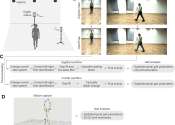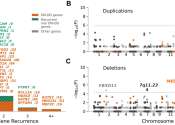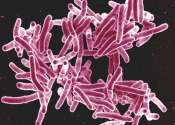Last update:
Biomedical technology news
Biomedical technology
Hydrogel with ultrasound activation enables sustained drug release
Researchers at Michigan Medicine have developed a composite hydrogel capable of achieving sustained, steady drug release using ultrasound as a trigger.
10 hours ago
0
8
Radiology & Imaging
Exploring how melanin influences clinical oxygen measurements
Obtaining accurate clinical measurements is essential for diagnosing and treating a wide range of health conditions. Regrettably, the impact of skin type and pigmentation is not equally considered in the design and calibration ...
Sep 27, 2024
0
0
Disparities found for Non-Hispanic Black patients in hematopoietic cell transplantation use for hematologic cancers
Non-Hispanic Black patients in the United States appear to have persistent disparities in terms of hematopoietic cell transplantation (HCT) for various hematologic cancers, according to a study published online Sept. 18 in ...
Sep 27, 2024
0
0

A 'Google Earth' view of bone—with an eye toward disease prevention
Everyone knows that we can view the broad structures of our bones in the body by taking X-rays. Yet that's just scratching the surface. Science now has a host of new imaging and characterization techniques to go deeper, and ...
Sep 26, 2024
0
28

Organoids derived from gut stem cells reveal two distinct molecular subtypes of Crohn's disease
Crohn's disease—an autoimmune disorder—is characterized by chronic inflammation of the digestive tract, resulting in a slew of debilitating gastrointestinal symptoms that vary from patient to patient. Complications of ...
Sep 26, 2024
0
28

Engineering human heart tissue for scientific study
Northwestern Medicine scientists have developed a new way to measure heart contraction and electrical activity in engineered human heart tissues, according to findings published in Science Advances.
Sep 26, 2024
0
14

Microfluidic chip brings hope for sepsis prognosis and evaluation
A research team led by Associate Professor Yang Ke from the Hefei Institutes of Physical Science of the Chinese Academy of Sciences, in collaboration with the First Affiliated Hospital of Anhui Medical University, developed ...
Sep 26, 2024
0
0

Long-COVID sufferers are conserving strength with a 'hack' of their fitness tech
At the beginning of the pandemic, when people suffering from the long-term effects of COVID-19 faced more questions than answers from doctors, they began collecting data on themselves using fitness watches to better understand ...
Sep 26, 2024
0
1

Technology that listens: Benefits and challenges of voice assistants for the elderly
Loneliness has become a very important social problem in recent decades. The unwanted emotions it can cause have a direct impact on people's psychological well-being and are related to an increased risk of isolation, a decline ...
Sep 26, 2024
0
0

Real-time data to understand what happens when a person loses their balance
Researchers at Virginia Tech are using wrist-worn voice recorders to capture real-world data to better understand what happens when people lose their balance. The study, led by Michael Madigan in the College of Engineering, ...
Sep 26, 2024
0
0

Headband helps people fall asleep by aligning audio signals with brainwaves
Do you ever toss and turn in bed after a long day, wishing you could just program your brain to turn off and get some sleep? That may sound like science fiction, but that's the goal of the startup Elemind, which is using ...
Sep 26, 2024
0
2

Single-dose gene therapy is potentially life-changing for adults with hemophilia B
Adults with hemophilia B saw their number of bleeding episodes drop by an average of 71% after a single infusion of gene therapy, according to the results of an international Phase III clinical trial published in the New ...
Sep 25, 2024
0
14

Engineers use bioprinted blood vessels to model deadly brain tumors
Glioblastoma is a brain cancer with very poor survival outcomes. Most drugs can't cross the blood-brain barrier, which means that unlike other cancers, there just aren't that many therapies available for brain tumors.
Sep 25, 2024
0
26

Researchers develop stretchable, biodegradable, self-healing conductor for medical sensing devices
A team of engineers, materials scientists and medical device specialists affiliated with several institutions in Korea and the U.S. has developed a new material for use as a medical sensing patch.

Digital biomarkers shed light on seasonality in mood disorders
Wrist-based activity sensors worn by individuals with depression and those without over the course of two weeks provided evidence for the relationship between daily sunlight exposure and physical activity, according to a ...
Sep 25, 2024
0
27

Stem cells map reveals molecular choreography behind individual variation in human development
Researchers at the Johns Hopkins University School of Medicine have mapped variation in human stem cells that explains how cells of an individual may shape a unique "developmental dance" at the molecular level, thereby controlling ...
Sep 25, 2024
0
10

Q&A: New tech could improve care for Parkinson's patients
The number of people living with Parkinson's disease globally has doubled in the past 25 years. Yet the treatment and monitoring of the neurological disease seems many decades behind. Clinicians typically gauge the severity ...
Sep 24, 2024
0
13

Surrogacy is booming. But new research suggests the pregnancies could be higher risk for women and babies
A new study from Canada has found women who agree to carry and birth babies in surrogacy arrangements face a higher risk of complications than other pregnant women.
Sep 24, 2024
0
0

Proof-of-concept study shows breath analysis can diagnose respiratory infections
A proof-of-concept study promises the speedy diagnosis of lower respiratory tract infections through analysis of human breath. The work is published in PNAS Nexus.
Sep 24, 2024
0
0

A microarray-based high-throughput in situ tagged immunoprecipitation sequencing technology for diffuse midline glioma
Diffuse midline glioma (DMG) is a highly aggressive and fatal pediatric high-grade glioma that primarily affects critical regions of the central nervous system, such as the pons, thalamus, and spinal cord. Due to the high ...
Sep 24, 2024
0
0

Unlocking the potential of patient-derived organoids for personalized sarcoma treatment
Investigators at the UCLA Health Jonsson Comprehensive Cancer Center have developed the largest collection of sarcoma patient-derived organoids to date that can help improve the understanding of the disease and better identify ...
Sep 20, 2024
0
9

Harnessing the power of eye tracking in brain-machine interfaces
In recent years, eye tracking technology has advanced rapidly, suggesting that our eyes deserve greater attention within the evolving brain-machine interface (BMI) landscape. One particularly intriguing area is the connection ...
Sep 20, 2024
1
16

Wearable biomonitoring: A sensor for continuous and stable monitoring of respiration
Recurrent wheezing is a serious morbidity, and it is estimated that about one-third of school-age children exhibit this symptom in the first five years of life. Recurrent wheezing in childhood is a significant risk factor ...
Sep 20, 2024
0
0

From lab to patent: Undergrad creates smart syringe for bioprinting
Sometimes a researcher goes into the lab and comes out with a discovery. Sometimes that discovery is issued a patent. Very rarely does the process also involve an undergraduate, a potential breakthrough for biomedical printing ...
Sep 20, 2024
0
0

New ventilator-on-a-chip model enables real-time detection of lung injury at cellular level
For the first time, scientists are able to directly compare the different kinds of injury that mechanical ventilation causes to cells in the lungs.
Sep 19, 2024
0
26













































